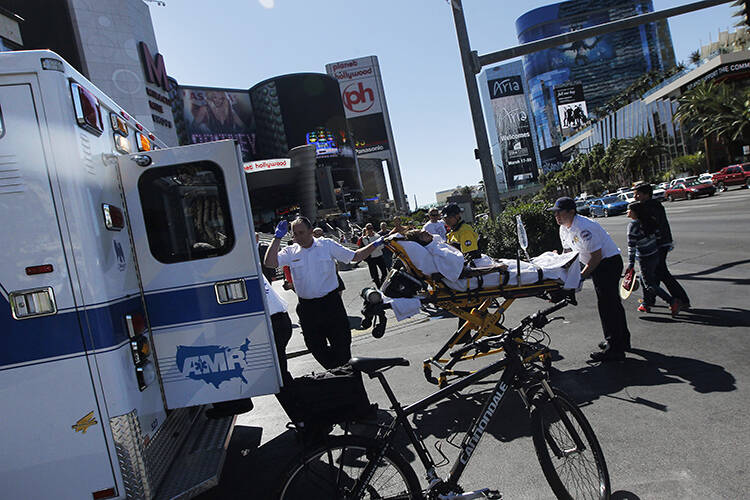Here’s what Clark County is doing to speed up ambulance response times

Clark County and private ambulance companies are hoping to provide better response times to emergencies and ensure the right level of care is available for those in need through a new protocol.
County commissioners voted Tuesday to approve a change to its contracts with three major ambulance companies in the valley to allow for certain emergency medical service professionals to respond to non-life-threatening calls.
“We’re adjusting the system to make sure we have appropriate amount of resources available,” Clark County Fire Department Deputy Fire Chief Jennifer Wyatt said.
The change will allow EMTs and advanced EMTs to respond to certain calls that previously — under the agreement between Clark County and the ambulance companies — would have required a paramedic to respond. The change is meant to free up paramedics, who are able to provide a higher level of care, to respond to more critical, urgent emergencies.
Advanced life support, a level of care that can be provided by paramedics, is a designation reserved for calls when an individual is in a life-threatening situation, like a heart attack. Intermediate life support, care that EMTs and advanced EMTs can provide, is used for situations when an individual is experiencing moderate distress, such as severe dehydration or a broken bone.
Damon Schilling, the public affairs manager for American Medical Response and MedicWest Ambulance, two of the ambulance companies the county contracts with, said an analysis of call and response data from the past few years showed many calls paramedics were expected to respond to didn’t actually require an advanced level of care.
And with a nationwide shortage of emergency medical service professionals, especially paramedics, prioritizing which calls they respond to is important, said Damon Schilling, the public affairs manager for AMR and MedicWest.
“That cut foot now can be ran on by an advanced EMT, who is fully capable of caring for that individual — bandaging, splinting, whatever else may need to take place,” Schilling said. “And it really frees up that [advanced life support] resource to respond to that more critical or higher acuity call.”
The change was just one suggestion made by the Clark County Fire Department in a corrective action plan approved by commissioners in June.
The plan also reduced the service area for MedicWest and AMR, both owned by Global Medical Response, after both companies consistently failed to meet required average response times mandated through their agreement with the county. The change increased the coverage area for the third ambulance company, Community Ambulance, to 65 percent of the county.
The contracts require ambulances to arrive at certain medical emergencies in under 12 minutes at least 90 percent of the time on a monthly average.
The newest change will help those response times, Schilling said.
But despite the change, Glen Simpson, senior director of Community Ambulance, said the company still intends to put as many paramedics on the road as possible.
“The way Community Ambulance structures ourselves, and the way that we run our operation is 95 percent of the resources that we put on the road daily are all advanced life support resources,” Simpson said.
Ultimately, the change will be beneficial for the community, Schilling said. “For the Las Vegas community at large, they just need to know that this is something that is highly beneficial,” Schilling said.
Contact Taylor R. Avery at TAvery@reviewjournal.com.